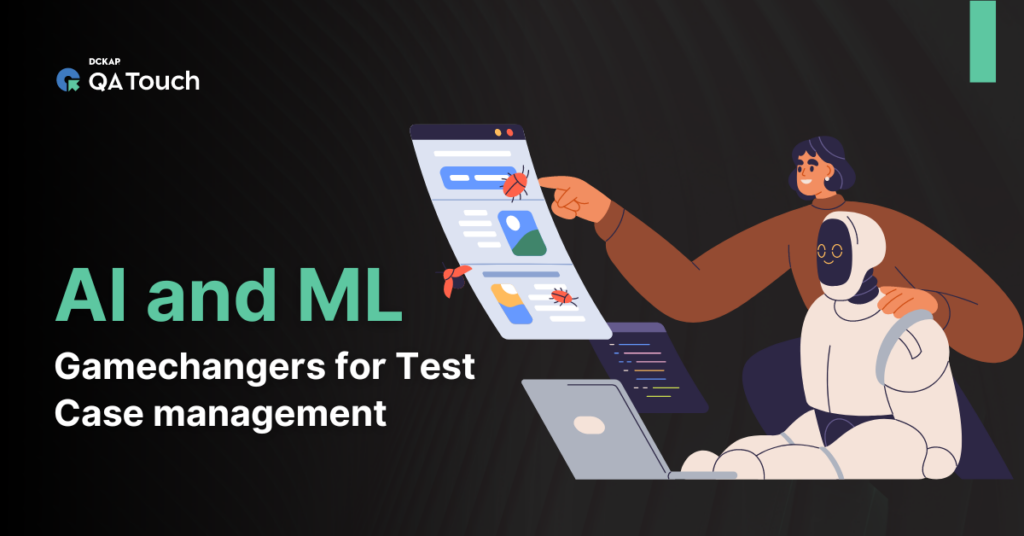Introduction to Artificial Intelligence (AI) and Machine Learning (ML)
One of the most commonly used buzzwords in the last few years or so has been AI and ML. These two broad concepts are expected to revolutionize every sector of software and test case management is no different. Since the AI-powered language model ChatGPT made waves with its release last year, there have been a broad range of AI-augmented technologies that have appeared, whose benefits cannot be ignored.
If you’re working in test case management or are looking to leverage AI for it, we’ve got a quick guide to get you started on the same. Read on to understand more about how to take Quality Assurance to the next frontier.
Brief Overview of AI and ML
Before delving into the deeper concepts of how ML and AI can be differentiated and used for test cases, it’s important to understand the difference between the two. In many cases, you might have noticed that AI and ML are used interchangeably and while that’s understandable, there are subtle differences between the two.
AI refers to an overall term that covers any event where a computer has to apply its own or some form of intelligence to solve any problem. This is done without any real specific programming coded into it. Machine Learning is one of the main techniques used to achieve this. It kind of forms the basis of many AI systems but is not the whole point of AI itself.
Understanding Test Case Management:
What is Test Case Management?
Test case management is about managing and organizing testing software, and making sure that every single process and flow in the software code is tested. There are predefined scenarios that include the creation, execution and tracking of test cases to verify software functionalities encompassing all the requirements.
Proper test case management helps identify any errors, ensures proper coverage of scenarios and improves the overall software quality. It includes things like planning and designing the test activities and cases, executing them and finally reporting findings, that are mostly facilitated by management tools to streamline the overall process.
The Role of AI and ML in Test Case Management
Both ML and AI have a big role to play in software testing to enhance and improve efficiency and processes, and to ensure better software releases in the future. Here are a few ways in which they are reshaping the sector:
How AI and ML are reshaping test case management:
Organizations that use AI and ML can eliminate gaps in the testing process by integrating people skills and the software’s analytical ability for real-time data. They are also super valuable due to the software quality and scalability factors.
Transitioning to automation helps in saving time and provide various business objectives:
- Improved execution speed
- Revenue creation
- Better accuracy and compliance and
- Savings for the long-term
AI can assist in creating test scripts and reduce routine maintenance work. Also, in cross-platform testing, QA analysts can harness its qualities to reduce effort and time on particular scenarios.
Benefits of Using AI and ML for Test Case Management
Improved Test Coverage:
ML and AI improve software testing by extending its coverage past the hitherto limits. They can do a deeper analysis of code and understand vast datasets to identify any untested areas, thus culminating in a more thorough process. By also being able to predict areas of high-risk, they can remap and assign priority numbers to efforts, and cover a higher number of scenarios.
Test efficiency:
By automating complex test scenarios, ML and AI can boost the overall efficiency of the testing process. By quickly adapting to any edits or changes in the software, they can reduce the overall time required for the maintenance and execution of tasks. Overall, it can lead to quicker development cycles and also in-time release of software that meets quality standards.
Reducing manual errors:
ML and AI can reduce human intervention for repetitive tasks, and overall bring down the percentage of any manual errors. These technologies can ensure better accuracies in overall results and automate the detection of any inconsistencies and faults.
Increased reusability of test cases:
ML and AI algorithms can analyze the existing test cases and identify potential cases for reuse in different projects. This is an incredible addition because it can improve the testing consistency across development cycles and improve time deliverables, especially on big projects.
Implementing AI and ML in Test Case Management
Let’s delve into the various factors to consider when implementing ML and AI in overall test case management:
Essential factors to consider when implementing AI and ML in Test Case Management:
Selection of model:
One of the most important and pertinent pointers to take into consideration is the availability and choice of model. That’s because this decision will impact the organization’s AI future owing to its dependence on the same. In addition to the availability of data, other factors also affect the choice of the AI model.
The diversity and the necessary performance metrics along with the software complexity can play a decisive role. Neural networks, ensemble methods or even decision trees are better suited for multiple types of testing needs. Organizations have to constantly check their requirements and upgrade them to keep up with the times. The models that are selected have to be done so under the headers of reliability and their overall efficacy.
Expertise and knowledge:
Advanced tech like machine learning requires someone who has a strong knowledge of the domain. Most of the subject matter experts who work with a certain level of expertise can do the necessary work required to derive the necessary insights. Once done, they can course correct and figure out exactly where the necessary errors need to be rectified. This act will help in optimizing and maintaining the overall performance of the tech.
Model interpretability and transparency: All of the stakeholders who are present in the process of integrating the AI have another role to play. This involves understanding the transparency and interpretability so that the automated process can be improved by itself. By doing that, they will be able to create synergy between the various collaborating teams.
Step-by-step guide on AI and ML Integration in Test Case Management
Define the overall goals: The overall goals of an organization have to align with what they need to use the AI and ML for. Whether it’s for repetitive tasks or test case automation, the outcomes have to be clearly defined.
Data prep and collection: Historical data must be checked for both scenario diversity and quality. This can clean and annotate data and also be used for any real world applications as well.
Selecting the model: Once the models are constructed, testing begins. Try multiple scenarios to see which could produce ideal results.
Integration: Proper integration is required for the AI to communicate with the necessary processes and systems. Having the infrastructure in place is crucial for the success of the systems.Correction and
repurposing: Basic and deep knowledge tweaking and corrections from time to time is needed. By maintaining the model correctness is a prerequisite for long-term success of the systems.
Challenges in the Implementation of AI and ML in Test Case Management
The data quality:
Any AI system is only as good as the data that’s fed to it to train on. AI builds upon this data, so it must be checked for overall goodness and value. If it’s not relevant, precise or even correct, then AI will end up making decisions that aren’t in line with what is expected.
Organizations must practice exercises to assess data quality and take the required steps to improve the same. Data preprocessing and cleaning techniques can eliminate overall inconsistencies, errors and any issues of duplicity. Also, real-world usability must be checked for the data to ensure it is representative of the same.
Model transparency and interpretability:
Creating, developing and training models that can be interpretable and accurate is a challenge by itself. There is a discrepancy between transparency and model complexity as more complicated models become harder to interpret.
Expertise and knowledge:
The dearth of professionals who are proficient in ML/AI tech as well as specific domain knowledge is a challenge by itself. Organizations need to invest in special training and skill development to build these competencies, either internally or seek external experts.
The Future of AI and ML in Test Case Management
AI and ML in test case management has incredible potential for the optimization and streamlining of the software test case process. By leveraging the relevant AI algorithms and models, organizations can prioritize test executions based on risk elements, automate the case creation process and also gain requisite insights to improve future software quality.
Predicted Trends and Developments
Automated test case generation:
One of the biggest applications of AI will be to analyze existing code and behavior modalities. Once done, it can generate insights from past test data and create new scenarios with ease. This can prove useful for humans to focus on more pressing tasks that may seem complex.
Self-healing automated tests:
Automation frameworks can self-heal and adapt as per the changes to the frameworks made. These ML algorithms will also be able to update test scripts and data to improve reliability and reduce overhead.
Optimization:
Code changes, historical test data optimization and defect pattern detection can be created through these models. They can also prioritize test cases and maximize coverage with higher risks.
Impact on the Software Testing Industry
Testers have to be careful when using AI and ML to improve the software testing process. They have the potential to improve release quality and simplify the testing process with the right approach and understanding.
Software testing can benefit from better precision, efficacy and create an overall efficiency that can result from the use of ML and AI.
Conclusion: The Potential of AI and ML in Test Case Management
Therefore, AI and ML have the potential to greatly improve test case management by making it more straightforward, easier, and optimized. In addition to rapidly finishing millions of lines of code, this can free up testers’ time to focus on more complicated jobs that require human interaction.
The key to AI and ML success or failure for any given firm is on the quality of the training of these models. There will come a day when this technology is well-suited for use in testing procedures, given the steady improvement in software quality. Artificial intelligence (AI) and machine learning (ML) have the potential to revolutionize many existing processes when applied with the appropriate degree of practicality and practice.






